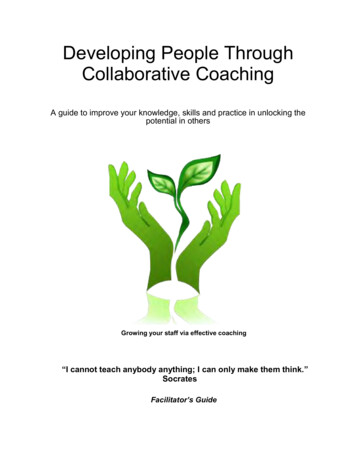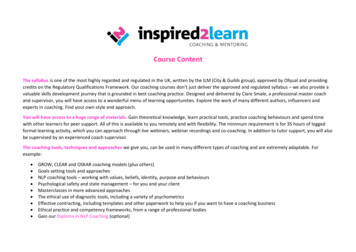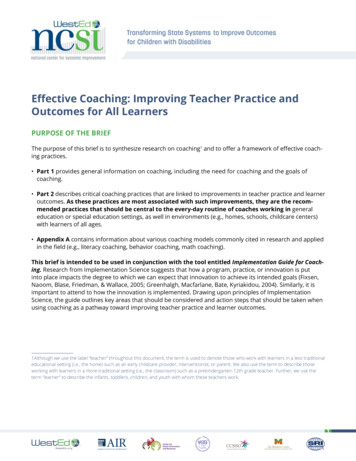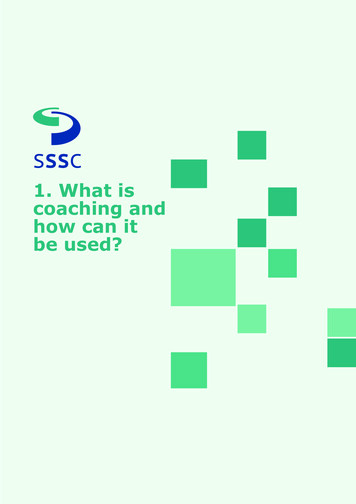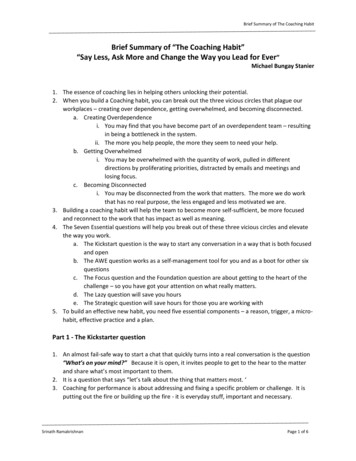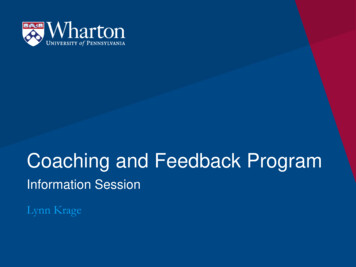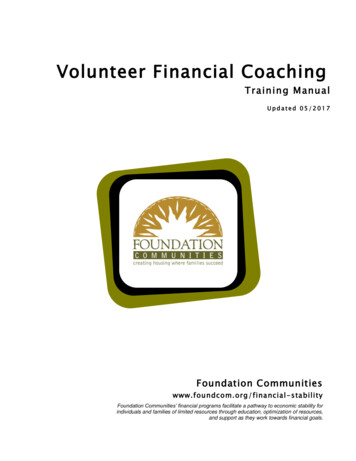
Transcription
Volunteer Financial CoachingTrain in g M anu alUpdated 05/2017Foundation Communitieswww.foundcom.org /financial -stabilityFoundation Communities’ financial programs facilitate a pathway to economic stability forindividuals and families of limited resources through education, optimization of resources,and support as they work towards financial goals.
Table of ContentsSection I: General InformationFinancial Coaching Staff and Locations . 3Volunteer Job Description and Policies . 4Our Clients . 10General Strategy and Guidelines . 11Recommended Reading and Playing . 13Section II: Financial Tools and ResourcesTopic: Planning and Saving for Goals. 16Topic: Creating a Budget . 17Topic: Banking . 20Topic: Debt . 24Topic: Maximizing Income . .30Topic: Public Benefits .31Clients in Crisis . 39FC Programs that Financial Coaches Help Clients Access .41Section III: Empowering Clients using Coaching StrategiesCoaching Fundamentals . 45Strategy: Asking Powerful Questions . 48Strategy: Active Listening . 55Coaching Tips . 56COACH Model 58Section IV: Credit CounselingConsumer Rights and Credit . 61The Credit Report . 66The Credit Cycle . 70Credit Scores .71Helping Clients Improve their Credit . .73Helping Clients Reduce Debt . .79Section V: Resources, Guides and AnswersCommunity resources for clients . 82FC Financial Stability Programs for Clients . 83Resources for Coaches . 84FAQ . 861
Foundation CommunitiesVolunteer Financial CoachTrainingSection I:GeneralInformation2
Financial Coaching Program Staff , Location and HoursFinancial Coaching appointment line512-610-4026Bernie y Financial Center Navigator (South)737-717-4000Susie GarciaSusie.Garcia@foundcom.orgCommunity Financial Center Navigator (North)737-717-4000Erika LeosErika.Leos@foundcom.orgFinancial Coaching Coordinator512-610-7387Eliana BrantEliana.Brant@foundcom.orgFinancial Stability Volunteer Coordinator512-610-7375Jackie BlairJackie.Blair@foundcom.orgDirector of Volunteer Programs512-610-73773Community Financial Center SouthCommunity Financial Center North2600 W. Stassney Ln.5900 Airport Blvd.Austin, TX 78745Austin, TX 78752Bus routes 311 and 238Bus routes 7, 10, 300, 320, 350 and MetroRailHours of OperationHours of OperationMon-Thurs, 10 am-7 pmMon-Thurs, 10 am-7 pmFri-Sat, 9 am-1 pmFri-Sat, 9 am-1 pm
Financial Coach Job DescriptionProject description: The Financial Coaching Program offers low-income individuals and families the opportunityto work one-on-one with a trained volunteer. Volunteers will help clients create and reach their goals, paving apath to overall financial stability and a better understanding of how to manage the daily interaction betweentheir finances and personal lives.Responsibilities: Depending on the client’s needs, volunteers will help to establish financial goals, get financiallyorganized, improve credit, reduce debt, and set up a livable budget. The coach's main role is to provide theimpetus and accountability in setting accomplishable goals, as well as providing the resources necessary to reachthem.Skills: Coaches need to be organized, resourceful, and understanding of clients’ various needs and lifeexperiences. While it does help when our volunteers have experience with financial planning and budgeting, weseldom deny volunteers for a lack of credentials. It’s just as important that our coaches be empathetic andresourceful in approaching the unique issues that each client will bring in. Our best coaches are able to dealequally well with numbers, people, and new challenges. Coaches are expected to be at least twenty-five yearsold, with few exceptions.Time Commitment: Volunteers are expected to give 30 hours over the course of one year. Appointments will bescheduled based on the coach’s availability, with offices open Mon—Thurs from 10:00am to 7:00pm, and Fri—Sat from 9:00am to 1:00pm.Dress Code: The dress code is casual at minimum, business casual preferred. No street wear and no attire thatwould be appropriate for bed, the gym, the pool or lake, or the club. Please make sure clothes are clean and nottorn.4
What is Financial Coaching?Financial Coaching is a client-driven process in which individuals and families work to reach personalized goalsrelated to improving their financial well-being. Coaches should not provide expertise on their clients’ financialissues, but offer tools and resources, encouragement, and monitoring throughout the process of self-directedbehavior change. Specifically, financial coaches in Texas will adhere to the following criteria: Support individuals and families as they practice new behaviors and skills;Guide clients through the self-directed process by engaging in active listening and critical questioning;Partner with clients to assist them to establish beneficial financial habits that will support healthy longterm financial behaviors;Empower each client to be the expert on his/her specific need(s), goal(s), and choice(s) and to setreasonable goals and timelines;Respect clients’ decisions and goals;Motivate every client to create an action plan that suits his/her individualized goal(s);Encourage the clients as they work through each step of reaching their goal(s) by providingaccountability and keeping them on track with their action plans.Standards and Core Competencies of a Financial Coach 5Financial coaches are trained on basic personal finance and individual coaching methods. These skillshelp coaches provide professional assistance in the development of habits and behaviors that enableindividuals to meet their designated financial goals.Financial coaches use appropriate communication skills to enable clients to be the experts for their ownfinancial situation, and to make all client-driven decisions about financial matters (i.e. goal-setting,changing behaviors, putting together an action plan, etc.).Financial coaches use effective assessments and tools to encourage client learning and behavioralchanges necessary to reach financial goals.Financial coaches know when to refer a client to a different organization if his/her needs are outside thescope of the financial coach’s job skills or expertise.Financial coaches demonstrate professional boundaries without offering financial advice to clients.Financial coaches maintain confidentiality and respect the client’s privacy by not disclosing anyinformation revealed at any time, except in a situation where both parties agree to do otherwise basedon the circumstances at hand.Financial coaches work to establish a trusting relationship with every client based on honesty andmutual respect.Financial coaches provide disclosure to a client of any potential or perceived conflicts of interest.Financial coaches representing any nonprofit or social welfare organizations in Texas provide financialcoaching services at low- or no cost to their clients, and do not sell, distribute or receive any monetarycompensation for the sale of a financial product or related information.Financial coaches in Texas will adhere to this set of Standards and Core Competencies when providingcoaching services to clients in Texas.
Foundation Communities’ financial programs facilitate a pathway to economic stability for individuals andfamilies of limited resources through education, optimization of resources, and support as they work towardsfinancial goals.Volunteer Philosophy Statement:We believe that our volunteers and staff members are the greatest resource to the Financial Stability Programsof Foundation Communities. Volunteers and staff will work side by side to deliver our mission of empoweringlow-and-moderate income families and individuals with the tools they need in their pursuit of economic success.Although responsibilities may differ, we believe that volunteers and staff members should both lead and serve.Volunteers are vital and essential to the Financial Stability Programs of Foundation Communities.Volunteer Bill of Rights:- Volunteers will be treated like coworkers, with the utmost professionalism and courtesy. Volunteers willnot be seen as “free” help.- Volunteers have the right to be heard. We are committed to providing effective channels ofcommunication for feedback and efficient conflict resolution.- Volunteers will be given the opportunity to provide feedback on what support they need, helping us toprovide a better experience for volunteers, clients, and staff.- Volunteers have the right to receive the appropriate training necessary to fulfill their roles andresponsibilities.- Volunteers have the right to work in a safe and friendly environment. You have a right not to tolerateworking in an environment of disrespect, harassment or abuse of any form.- Volunteers have a right to work in an environment that supports and encourages diversity.- Volunteers have the right to work in an environment that supports personal and professionaldevelopment.- Volunteers have the right to be and will be recognized and acknowledged for their commitment andtalent.Volunteer Standard of Conduct:- Volunteers will treat clients professionally, courteously, and respectfully.- Volunteers will safeguard the confidentiality of clients in all matters at all times and will not shareinformation with others not having a role in delivering the service of such clients.- Volunteers will provide service to the best of their ability and act in the best interest of the client.- Volunteers will only provide services they are qualified and trained to give.- Volunteers will exercise reasonable care for equipment, materials, and spaces owned or used by ourprograms and/or partners.- Volunteers will not solicit business from clients.- Volunteers will not act as a representative of a company, organization, or a field in which they workwhile volunteering.- Volunteers will not accept payments or gifts for services provided.- Volunteers will follow the policies and procedures designated by all programs of FoundationCommunities.- Volunteers will sign policy and agreement forms prior to providing client services.6
Financial Coaching Volunteer PolicyFoundation Communities strives to offer high quality financial coaching in a confidential and unbiasedmanner. In order to accomplish this, Foundation Communities has established the following policiesthat all volunteers are expected to adhere to. Should any of the policies be violated, a volunteer maybe asked to discontinue his or her participation as a financial coach. Volunteers agree not to solicit any client for any paid service or meet with a client at anylocation outside of Foundation Communities’ approved locations.Volunteers pledge to maintain confidentiality about client’s personal financial issues and anyother personal matters shared during financial coaching sessions.Volunteers agree to be an unbiased source of financial information, not a representative of thecompany, organization or field they work for or in during all financial coaching sessions.Volunteers agree not to distribute business cards or materials promoting their employer or anyof their employer’s products; or ask the client to distribute any of the above materials.Volunteers who are employed in the financial services industry agree not to wear clothingand/or nametags with their company logo.Volunteers agree not to use client information such as telephone numbers and/or addresses foruse outside of financial coaching (with or without permission of the client).Any perceived conflict of interest must be disclosed to clients.Volunteers agree to act strictly in the best interest of the client.Volunteers agree not to take actions or make decisions on the client’ behalfVolunteers agree to be respectful of the actions and decisions taken by the clientVolunteers commit to volunteering at least 30 hours, including training, with the FinancialCoaching program within a 12 month period.Volunteers must not have in their possession illegal substances, firearms or open alcohol duringtheir volunteer time.I acknowledge and agree to abide by Foundation Communities’ Volunteer Policy.Printed nameSignature, dateEmployer7
Financial Coaching Volunteer PolicyFoundation Communities strives to offer high quality financial coaching in a confidential and unbiasedmanner. In order to accomplish this, Foundation Communities has established the following policiesthat all volunteers are expected to adhere to. Should any of the policies be violated, a volunteer maybe asked to discontinue his or her participation as a financial coach. Volunteers agree not to solicit any client for any paid service or meet with a client at anylocation outside of Foundation Communities’ approved locations.Volunteers pledge to maintain confidentiality about client’s personal financial issues and anyother personal matters shared during financial coaching sessions.Volunteers agree to be an unbiased source of financial information, not a representative of thecompany, organization or field they work for or in during all financial coaching sessions.Volunteers agree not to distribute business cards or materials promoting their employer or anyof their employer’s products; or ask the client to distribute any of the above materials.Volunteers who are employed in the financial services industry agree not to wear clothingand/or nametags with their company logo.Volunteers agree not to use client information such as telephone numbers and/or addresses foruse outside of financial coaching (with or without permission of the client).Any perceived conflict of interest must be disclosed to clients.Volunteers agree to act strictly in the best interest of the client.Volunteers agree not to take actions or make decisions on the client’ behalfVolunteers agree to be respectful of the actions and decisions taken by the clientVolunteers commit to volunteering at least 30 hours, including training, with the FinancialCoaching program within a 12 month period.Volunteers must not have in their possession illegal substances, firearms or open alcohol duringtheir volunteer time.I acknowledge and agree to abide by Foundation Communities’ Volunteer Policy.Printed nameSignature, dateEmployer8
This page intentionally left blank.9
Our ClientsClients’ annual household income is no more than 55,000.In 2014, the average household income was 27,000.Financial Coaching Clients face many financial challengessuch as limited incomes, limited savings and assets, no orpoor credit, limited exposure to financial managementconcepts and practices, and barriers to financial mainstream.To see a snapshot of how much ittakes to get by in the Austin area,visit the Economic Policy Institute’sFamily Budget Calculator:www.epi.org/resources/budget/.In addition, they are often dealing with other challenges such as unreliable transportation,unpredictable work schedules, attendance requirements for children’s activities, accessing publicbenefits, health issues (both physical and mental) and limited access to medical care.Some clients face personal barriers such as fear, procrastination, lack of resources, lack of time andenergy, weak relationships and support systems, feeling inept, isolation, making assumptions, as wellas many others, which have kept them from fulfilling their potential.Clients choose the day and time of their appointment through our scheduling system. They are askedto confirm after scheduling the appointment and they are reminded by phone and/or email of theirappointment.One out of every seven clients that schedule an appointment doesn’t show up to their firstappointment and doesn’t call to cancel the appointment. Clients have cited things like transportationissues, health issues for themselves or a family member or other last-minute commitments as thereason for not attending. One in four appointments is cancelled in time to notify the coach.Some clients come to one session, then don’t come back. For many clients, the question or concernthey had was addressed. Continuing to meet is the choice of the client, and we depend on you, thecoach, to make them feel inspired to come back and continue to work toward their goals.A few clients are required to participate in Financial Coaching to fulfill requirements of other programs,often financial assistance programs. We are working with the agencies that require their clients toparticipate in Financial Coaching so that both case managers and clients understand the nature of theprogram, what is expected of the clients and what they can expect from the program.Some clients come to Financial Coaching with low literacy skills. One in ten adults in Central Texasstruggle with reading or cannot read1. A coach’s patience and empathy will be very important inworking with low literacy individuals.1Source: Literacy Coalition of Central Texas: A Snapshot of Conditions10
General Strategy and GuidelinesStrengths Based Financial CoachingStrengths based coaching uses the coach’s affirmations to allow the client to acknowledge and build onexisting strengths, as well as gain new skills and knowledge to help them better manage their currentsituation and future financial decisions. There are four steps of strengths based coaching.1. Inspire the client with praiseBreaking through the shame and embarrassment the client may be experiencing when having financialdifficulties is a tremendous step. Asking for help is not an easy task. During the first conversation,praise them for taking this step. This praise will encourage them to do the hard work that is beforethem.2. Empower the client with educationYour client may not have strong financial skills. The successful financial coach will create a learningspace where both the coach and client can learn and explore strategies for successful financialmanagement as appropriate for that client.3. Guide the client through goal setting and problem solvingThis may be one of a few times the client has done extensive budgeting, set financial goals, or usedproblem solving skills in an intentional manner with their finances. Without judgment, guide themthrough their financial situation by helping them identify budget constraints and develop a plan thattakes them into a life where they control their finances rather than their finances controlling their life.4. Restore the client’s hope and confidenceAllow the client to take small steps to restore their confidence in themselves. When the client doesthe work themselves there is pride and a restored self esteem that starts to emerge. Encourage smallvictories and help the client set themselves up for success in the days ahead.5. Engage the client in a long-term process of self-improvement.For most of us, the process of improving our financial well-being is a long-term process. Goals arerarely reached after one Financial Coaching session. Engage our clients in this long-term process byreminding them of their goal and inviting them to continue to meet with you for accountability andsupport along the way.11
Coaching Guidelines1. Know your roleKnow your role as a coach and recognize the boundaries and limitations of the Financial Coachingprogram. Any issues outside the boundaries of the program need to be referred to the staff. You don’tneed to be a counselor or a therapist. Financial Coaches do not give advice on legal matters,bankruptcy, taxes, foreclosure, investments or any other matters requiring specialized training orlicensing.2. Resist the urge to fixOften the objective eye of the coach might quickly identify the client’s problems and solutions toresolve the situation. However, it is important that the coach set aside their instincts to solve theclient’s problems. While it may save time for the coach, it may be destructive to the client. When thecounselor makes the decisions it removes the opportunity for the client to make decisions, takeimportant steps to restore their self confidence, and ultimately take control of their lives.3. Keep in mind the emotional ties with moneyA client may have developed certain behaviors because of some other emotional issue in their lives.This might make it difficult for the client to take steps that the coach may find simple. Allow the clientto lead the discussions on actions and behavioral changes.4. Restrain your inner criticClients come in with a wide range of experiences that shape who they are. They represent all types oflifestyle choices, financial decisions, parenting styles, religions and races. They also come in with theirown goals, which may not be the same goals the coach would have for the client. The coach must setaside their own personal biases so that their coaching is not hampered by preconceptions.5. Know your boundariesDon't offer or accept things like rides, meals, money or any other gift.You can give your clients a way to contact you directly, but try to avoid giving them your home phonenumber. Email or work contact is better. You don’t have to give them any of your contact info at all.Our scheduling system will allow your clients to request an appointment without sharing your contactinformation.12
Recommended ReadingWhat It’s Worth: Strengthening the Financial Future of Families, Communities and the Nation.From The Inclusive Economy: The book—a project of the Federal Reserve Bank of San Francisco and CFED, withfunding generously provided by Citi Foundation—offers a 360-degree view of the financial problems andchallenges facing millions of American households. With input from dozens of experts representing fieldsranging from community development to public health to education, What It’s Worth highlights provenapproaches to building financial well-being and brings more people into an important conversation aboutbuilding economic opportunity.Nickel and Dimed: On (Not) Getting By in America, Barbara Ehrenreich.From Publishers Weekly: Determined to find out how anyone could make ends meet on 7 an hour, she [theauthor] left behind her middle class life as a journalist except for 1000 in start-up funds, a car and her laptopcomputer to try to sustain herself as a low-skilled worker for a month at a time. In 1999 and 2000, Ehrenreichworked as a waitress in Key West, Fla., as a cleaning woman and a nursing home aide in Portland, Maine, and ina Wal-Mart in Minneapolis, Minn. During the application process, she faced routine drug tests and spurious"personality tests"; once on the job, she endured constant surveillance and numbing harangues over infractionslike serving a second roll and butter.Scarcity: The New Science of Having Less and How It Defines Our Lives, Sendhil Mullainathan, Eldar ShafirFrom Publishers Weekly: The struggle for insufficient resources—time, money, food, companionship—concentrates the mind for better and, mostly, worse, according to this revelatory treatise on the psychology ofscarcity. Harvard economist Mullainathan and Princeton psychologist Shafir examine how scarcity in manyforms, from poverty and scheduling pressures to dieters' food cravings and loneliness—a kind of social scarcity—force the brain to focus on alleviating pressing shortages and thus reduce the mental bandwidth available toaddress other needs, plan ahead, exert self-control, and solve problems. The result of perpetual scarcity, theycontend, is a life fixated on agonizing trade-offs, crises, and preoccupations that impose persistent cognitivedeficits—in poor people they lower mental performance as much as going a night without sleep—and reinforceself-defeating actions. The authors support their lucid, accessible argument with a raft of intriguing research inpsychology and behavioral economics (sample study: We recruited Princeton undergraduates to play FamilyFeud in a controlled setting ) and apply it to surprising nudges that remedy everything from hospitalovercrowding to financial ignorance. Mullainaithan and Shafir present an insightful, humane alternative tocharacter-based accounts of dysfunctional behavior, one that shifts the spotlight from personal failings to theinvoluntary psychic disabilities that chronic scarcity inflicts on everyone.Co-Active Coaching, Karen Kimsey-House, Henry Kimsey-House, Phillip Sandahl, Laura WhitworthFrom Amazon.com: When Co-Active Coaching was first released in 1998, this pioneering work set the stage forwhat has become a cultural and business phenomenon and helped launch the profession of coaching. Publishedin more than ten languages now, this book has been used as the definitive resource in dozens of corporate,professional development and university-based coaching programs as well as by thousands of individuals lookingto elevate their communication, relationship and coaching skills. The third edition emphasizes evokingtransformational change in the client and extends the use of the Co-Active Model into leadership managementand its effectiveness throughout organizations. This edition also contains an on-line Coach’s Toolkit (replacingthe CD of the second edition), several new coaching demonstrations and more than 35 updated exercises,questionnaires, checklists and reproducible forms.13
Recommended PlayingSpent, Urban Ministries of Durhamhttp://playspent.org/Urban Ministries of Durham serves over 6,000 people every year. But you’d never need help, right?Poverty Quiz, Poverty z/The domestic anti-poverty program of the U.S. Catholic Bishops, the Catholic Campaign for Human Development(CCHD) is an instrument of the Catholic Church working to break the cycle of poverty.Client FormsWe have put together a collection of forms and resources for you to use while working with clients. This will beyour main resource while working with clients. Use it often! In this guide, when we reference a form on theresource page, you will see this symbol:Volunteer Resource web page,financial-coaching-resources.weebly.com14
Foundation CommunitiesVolunteer Financial CoachTrainingSection II:Financial Tools& Resources15
Topic: Planning and Saving for GoalsOur clients all have goals, just like the rest of us. We can help them put a plan in place to accomplish them.When you have wanted to accomplish something in the past, what made reaching yourgoal possible?Use the Goal-Setting Forms page to help clients think through and make specific plans for reachingtheir goals. You can be there to support them and provide a sounding board as they develop theirplans. Forms with charts, such as “Planning and Saving for Goals,” allow those who work best with numbers toeasily see where they are and what they need to do with their money to reach their goals. Forms with open-ended questions, such as the “Goal Planning Tool,” allow those who need to be moreexpressive to visualize their goals and be motivated to work toward them. A super-visual “Game Plan” is available for those who really need to see their plan in graphics andpictures.16
Topic: Creating a BudgetCreating a budget may not be a client’s first priority. However, analyzing current earnings andspending is an important part of planning for any financial goal. Clients should create a basic budget asa step toward their larger goals.What method of budgeting do you use?What makes that kind of budget work for you?Several budgeting tools are available on the Budgeting Forms page to aid in the process. Please besure the budget is in a format
Volunteer Financial Coaching Training Manual Updated 05/2017 . Skills: oaches need to be organized, resourceful, and understanding of clients’ various needs and life experiences. While it does help when our volunteers have experience with financial planning and budgeting, we . including training, with t
